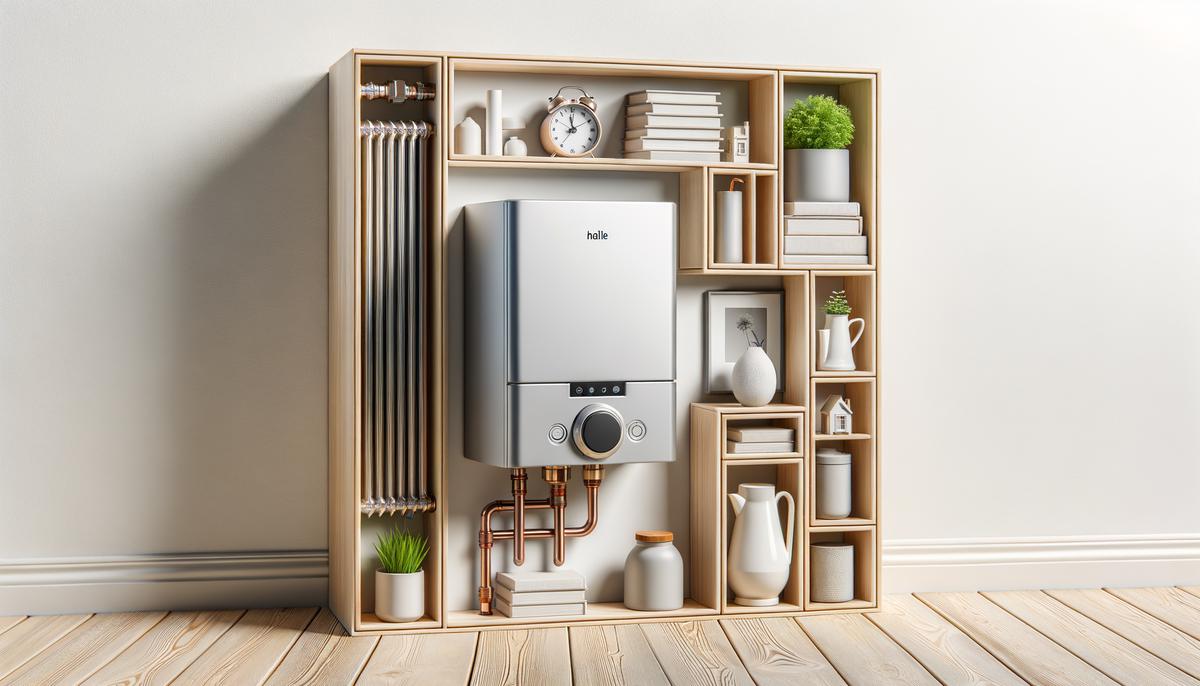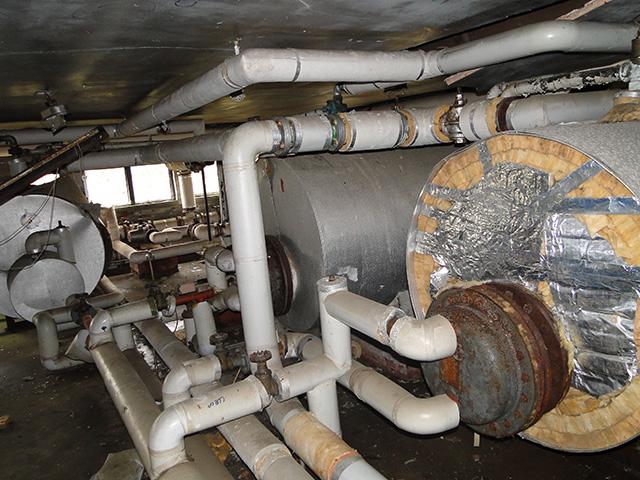Combi Boilers
Combi boilers, or combination boilers, are widely favored in the UK, primarily for their efficiency and compact design. These boilers combine the functionality of a central heating boiler and a hot water heater into a single unit, making them an excellent choice for smaller homes or flats with single bathrooms.
Connected directly to the mains cold water supply, combi boilers heat water on demand. This means you can enjoy hot water immediately whenever you need it, without the need for a separate hot water tank or a cold water storage tank. The integral heat exchanger heats the cold mains water as it flows over it, ensuring a continuous supply of hot water.
Combi boilers offer several advantages:
- They save space by not requiring separate water tanks, resulting in a neater appearance.
- Most engineers are familiar with these boilers, making it simpler to find someone qualified for repairs and maintenance.
- You get hot water immediately, without waiting for a tank to heat up.
- Modern combi boilers boast over 90% efficiency, reducing energy bills.1
- With only one unit to install, it's less complex compared to other systems, which can translate to lower energy bills.
However, combi boilers also have some drawbacks. Their functionality relies heavily on the mains water pressure, and low water pressure can affect performance. The hot water flow rate drops if multiple outlets use hot water simultaneously, and high-powered showers aren't compatible with combi boilers. The unit's moving parts increase the potential for mechanical issues.
Combi boilers are particularly well-suited for smaller households with a single bathroom and up to 10 radiators. They're perfect for homes where space is at a premium and there's no loft for a hot water tank. This makes them a popular option in flats and smaller houses.

Heat-Only Boilers
Heat-only boilers, also known as regular boilers, are an essential part of many UK homes, particularly those with a high demand for hot water. These boilers produce heat for your home and work in conjunction with a separate hot water storage cylinder and cold water storage tank. This type of boiler is often found in older homes with traditional heating systems.
A heat-only boiler heats water via a heat exchanger when the boiler burns fuel. This hot water is then pumped to a storage tank, typically located in the loft or airing cupboard. The heated water in this cylinder is what eventually flows through your radiators to heat your home and through your taps when needed. The cold water storage tank supplies the boiler with cold water for heating, relying on gravity to feed it into the system.
Heat-only boilers have several advantages:
- They can supply hot water to multiple taps simultaneously without a significant drop in pressure or temperature.
- They can be connected to solar water heating systems, helping to lower energy bills and reduce your carbon footprint.
- Even if the boiler experiences a breakdown, the hot water storage tank ensures that hot water will still be available for a short period.
- These boilers are ideal for homes with low mains water pressure, where a combi boiler might struggle.
- Generally, heat-only boilers are less expensive to replace because they are simpler and often older technology.
However, there are also some drawbacks to consider:
- As these systems store hot water, you may need to wait for the hot water tank to reheat if the stored water is used up.
- The need for a separate hot water cylinder and cold water storage tank means these systems take up more space compared to combi boilers.
- Heat loss from the hot water stored in the cylinder means these systems are less efficient compared to modern combi boilers.2
- Installing or replacing a heat-only boiler system can be more complex and expensive due to the additional components involved.
Heat-only boilers are particularly well-suited for larger households and properties with multiple bathrooms. Their capacity to supply hot water to several taps at once makes them ideal for homes where multiple occupants may need hot water simultaneously. They are also a good match for older properties with existing traditional heating systems, including loft-based cold water tanks and airing cupboard hot water cylinders.

System Boilers
System boilers, often referred to as closed-vent boilers, offer a middle ground between combi and heat-only boilers. These systems are designed to work in conjunction with a hot water cylinder but do not require a cold water storage tank, making them more efficient and space-saving compared to traditional heat-only boilers.
System boilers operate similarly to heat-only boilers but integrate many of the external components, such as pumps and valves, directly into the boiler unit. The boiler takes water directly from the mains, heats it, and then sends it to a hot water cylinder for storage. This setup allows you to have hot water readily available while still benefiting from the efficiency improvements of storing hot water.
System boilers have several advantages:
- Like heat-only boilers, system boilers can supply hot water to multiple taps simultaneously without a significant drop in pressure, making them ideal for homes with several bathrooms.
- System boilers eliminate the need for a cold water storage tank. This is particularly advantageous for homes without loft space or those converting loft areas into living spaces.
- Having the pumps and other critical components built into the boiler unit simplifies installation and maintenance, reducing the risk of component incompatibility and simplifying repairs.
- System boilers work well with modern central heating systems, including underfloor heating, providing versatility for various home setups.
- Since system boilers take their water supply directly from the mains, there is generally less heat loss compared to heat-only systems that store water in cold water tanks.
However, there are also some drawbacks to consider:
- While system boilers save space by eliminating the cold water storage tank, you still need space for the hot water cylinder, which can be a limitation in smaller homes.
- As with heat-only boilers, system boilers store hot water, which means you may need to wait for the cylinder to reheat once the hot water has been used up.
- The performance of a system boiler is directly tied to the mains water pressure. Homes with low mains pressure might not experience optimal water flow rates.
- In high-demand periods, such as using multiple showers at the same time, the hot water cylinder can run out of hot water, requiring waiting time for it to reheat.
System boilers are particularly well-suited for larger homes or properties with multiple bathrooms where the hot water demand is higher than average. Their ability to supply hot water to several outlets simultaneously makes them practical for households where multiple taps, showers, or appliances may need hot water at the same time.
Condensing Boilers
Condensing boilers are a highly efficient and environmentally friendly option that has become a mandatory choice for new installations since 2007. Their design significantly enhances energy efficiency by capturing heat that would otherwise be lost through the boiler's flue, thereby using less fuel and reducing greenhouse gas emissions.
Condensing boilers operate by capturing and reusing the heat present in the flue gases that conventional boilers would expel into the atmosphere. They achieve this through a process of condensation. As the water vapor in the flue gases cools down, it condenses back into liquid form, releasing latent heat. This additional heat is then used to preheat the cold water entering the boiler, reducing the amount of energy needed to bring the water to the desired temperature.
Condensing boilers offer several advantages:
- They are designed to be over 90% efficient, substantially higher than non-condensing models. This improved efficiency translates directly into lower energy bills, making it an economically attractive option.3
- By using less fuel and capturing more of the energy produced, condensing boilers significantly reduce the carbon footprint of a home. This results in a lower output of CO2 and other greenhouse gases, contributing to a cleaner environment.
- The increased efficiency of condensing boilers means that they use less fuel to provide the same amount of heat, leading to measurable savings on your energy bills.
- With the combustion process being more complete and efficient, condensing boilers produce fewer harmful emissions, reducing the risks associated with gas or oil combustion.
- Since 2007, building regulations have required new boilers to be condensing models wherever possible. This regulation ensures that new installations are more energy-efficient, aligning with broader environmental and energy-saving goals.
Condensing boilers play a critical role in reducing the environmental impact of home heating systems. Their design aims to maximize the amount of heat extracted from the fuel burned, making the boiler more efficient and reducing harmful emissions. This aligns with global initiatives to lower carbon footprints and combat climate change. By choosing a condensing boiler, homeowners not only save money but also contribute to a more sustainable future.
Harnessing cutting-edge technology, condensing boilers ensure that less heat is lost, more is utilized, and as a result, the overall energy consumption decreases. This makes them a preferable choice for anyone looking to enhance their home's energy efficiency and environmental stewardship.
Revolutionize your content with Writio, an AI writer for website publishers and blogs. This article was written by Writio.
- Boiler Guide. Boiler Efficiency Ratings Explained. Boiler Guide. https://www.boilerguide.co.uk/articles/boiler-efficiency-ratings-explained.
- Boiler Guide. Boiler Heat Loss Explained. Boiler Guide. https://www.boilerguide.co.uk/articles/boiler-heat-loss-explained.
- Energy Saving Trust. Condensing Boilers. Energy Saving Trust. https://energysavingtrust.org.uk/advice/condensing-boilers/.
Leave a Reply